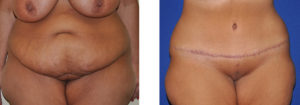
These very questions of whether a tummy tuck is associated with permanent weight loss and whether a tummy tuck can be used as a part of a ‘weight loss’ program were behind a recent study published in the February 2013 issue of Plastic and Reconstructive Surgery. In a paper entitled ‘ Weight Reduction following Abdominoplasty: A Retrospective Case Review Pilot Study’, the authors attempted to determine the most important factors associated with weight reduction after a tummy tuck. Over a 6 year period, 20 tummy tuck patients were followed long-term. All such patients had weight loss that was beyond that of the tissue removed during surgery. The maximum weight loss was seen at just under 12 weeks after surgery. The majority of them (70%) maintained this weight loss at one year after surgery. The identified reason was an increased sense of satiety of fullness after eating. The study also found that patients who had a body mass index that is 24.5 kg/m2 or greater or tissue removed that was greater than 4.5 lbs had sustained weight loss at one year after surgery.
The good news is that the bigger the patient and the more abdominal tissue that is removed, the greater the weight loss and the more sustained it is. Satiety is the most identified reason but why? One simple reason may be that the more tissue that is removed in a bigger patient, the harder it may be to gain it back. Another explanation is that of a change in the neuroendocrine system. When substantial fat is removed, the leptin that it produces may result in less hormonal stimulation to the appetite center in the brain. Either explanation is probably overly simplistic. But this study does correlate with what many plastic surgeons see…many tummy tuck patients keep the results of their surgery for years and complete relapses seem to occur in only a minority of cases.
While this study may be retrospective and only included a small number of patients, it suggests positive answers to both common tummy tuck questions. Tummy tuck results are persistent and it does not necessarily have to be done at the lowest weight possible to help a patient reach their weight loss goal.
Dr. Barry Eppley
Indianapolis, Indiana


